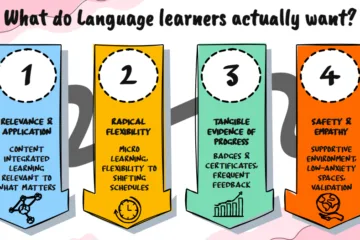The technology industry promises that AI translation will soon eliminate the need for human language learning, suggesting that automated tools will handle all translation needs instantly and perfectly. This narrative creates dangerous misconceptions that discourage businesses from investing in team language capabilities that remain essential for international success despite remarkable translation technology advances.
The technology capability reality
Modern translation tools have improved dramatically, handling basic communication tasks with reasonable accuracy. For straightforward information exchange, simple instructions, or factual content, automated translation often produces acceptable results. However, these tools consistently fail at nuanced business communication, cultural adaptation, and relationship building that determine international business success.
Translation technology excels at linguistic conversion whilst struggling with cultural context, emotional intelligence, and strategic communication that business relationships require. Teams depending entirely on translation tools face systematic disadvantages in competitive international markets where authentic human connection influences partnership and client decisions.
The relationship building limitation
International business relationships depend on rapport, trust, and authentic connection that translation intermediaries fundamentally cannot facilitate. When conversations flow through translation tools or services, the human connection essential for deep business relationships gets filtered, delayed, and diminished regardless of translation accuracy.
Corporate training that develops genuine language capabilities enables direct relationship building that creates competitive advantages. Clients and partners prefer working with people who can engage naturally in their languages, building trust through authentic communication that translation tools cannot replicate.
The cultural intelligence gap
Translation tools convert words whilst missing cultural context that determines whether communications land effectively. Idioms get translated literally, humour falls flat, indirect communication styles get misinterpreted, and cultural protocols get ignored because translation technology lacks the cultural intelligence that human language skills develop.
Business languages learning builds cultural competence alongside linguistic capability, creating professionals who understand not just what to say but how, when, and why to communicate effectively across cultural boundaries. This sophisticated understanding remains uniquely human despite AI advances.
The real-time communication requirement
Business negotiations, client meetings, and partnership discussions happen in real-time without pauses for translation tool consultation. Teams dependent on translation technology face awkward delays, lose conversational flow, and miss opportunities for spontaneous rapport building that natural multilingual communication enables.
Language classes that develop conversational competence create professionals who can engage naturally in business discussions without technological intermediation. This real-time capability proves decisive in competitive situations where communication fluency influences outcomes.
The strategic communication complexity
Business communication involves persuasion, negotiation, and strategic messaging where tone, emphasis, and subtle implication matter enormously. Translation tools handle explicit content whilst missing the strategic communication nuances that influence business outcomes.
Professional development in corporate training contexts builds communication sophistication that enables strategic messaging across languages. Employees learn not just language mechanics but business communication strategies that translation tools cannot substitute regardless of their linguistic accuracy.
The quality evaluation capability
Translation tools cannot evaluate their own output quality or recognise when automated translations miss intended meanings, create unintended implications, or sound awkward to native speakers. Teams without language capabilities cannot identify these problems, accepting flawed translations that damage business effectiveness.
Team learning that develops language skills enables quality evaluation of both automated translations and professional translation services. This quality assurance capability prevents communication failures that monolingual teams depending on translation tools cannot avoid.
The competitive intelligence access
Multilingual professionals access market intelligence, competitor information, and industry insights that remain invisible to teams depending on translation tools. Understanding competitor communications, monitoring market discussions, and accessing non-English resources requires language capabilities that translation technology doesn’t replace.
Corporate learning that builds business languages competence creates competitive intelligence advantages that compound over time. These information access benefits often justify training investments beyond direct communication improvements.
The professional credibility factor
International clients and partners evaluate business professionals partly through their communication capabilities. Teams that engage directly in multiple languages demonstrate international sophistication and serious market commitment that creates credibility advantages.
Language training produces professionals who signal genuine international competence through their multilingual capabilities. This professional credibility influences how clients and partners perceive your organisation’s international seriousness and capability.
The cost and dependency consideration
Whilst translation tools seem free or cheap, dependency on them creates hidden costs through communication limitations, relationship constraints, and competitive disadvantages. These opportunity costs typically exceed training investments over time as international business importance grows.
Professional language classes represent investments in capability assets that appreciate through use rather than expenses that recur indefinitely. This fundamental economic difference favours training over prolonged translation tool dependency for strategic international activities.
The emergency and flexibility advantage
Translation tools require internet connectivity, may experience service disruptions, and don’t work effectively in all communication contexts. Teams with genuine language capabilities maintain communication effectiveness regardless of technological availability or reliability.
Team learning that develops in-house multilingual competence creates organisational resilience and flexibility that technology dependency cannot match. This self-sufficiency proves particularly valuable during technological failures or in situations where translation tools prove impractical.
The integrated approach wisdom
Smart businesses recognise that translation tools serve useful support roles without replacing human language capabilities. Tools can assist with quick comprehension checks, support learning processes, or handle simple routine communications whilst human skills remain essential for strategic interactions.
At The Chat Laboratory, we help businesses understand realistic technology roles in comprehensive language strategies. Our corporate training builds genuine human capabilities that enable effective tool usage whilst maintaining the sophisticated communication competence that determines international business success.
Translation tools complement rather than replace human language learning. Teams that develop genuine multilingual capabilities whilst leveraging appropriate technology gain advantages over those depending entirely on either automated translation or refusing technological support completely.



0 Comments